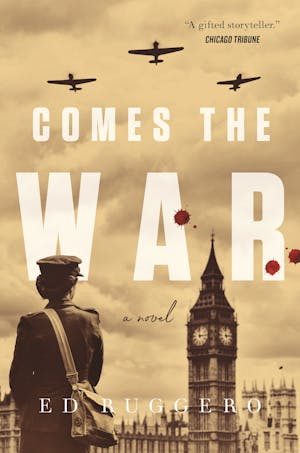1
20 April 1944
0625 hours
There was a white-helmeted American military policeman at the alley entrance when First Lieutenant Eddie Harkins got out of the staff car. He could see the body about thirty feet in, lying next to some rubbish cans; but there was no crowd, not a single curious onlooker, dead bodies having become all too common in bomb-smashed London. Inside the alley, a man in a dark raincoat squatted near the corpse, while another man stood writing in a pocket notebook.
The MP came to attention when Harkins approached, gave him a snappy salute.
“Who are those guys?” Harkins asked the soldier.
“Brits, sir. Detectives. They said the woman, the victim, is American, so they sent for us. Me and my corporal got here a few minutes ago and they told us to secure the alley. Corporal Quinn is down the other end.”
Harkins looked up and down the street, blocks of two- and three-story buildings, the ground floors mostly shops, judging by the signs. Not one with all its windows intact. He wondered where the victim had been coming from or going to.
“They give you their names?” he asked the MP, nodding at the detectives.
“Yes, sir.”
Harkins looked at the man, who said nothing.
“Care to share them with me?”
“Couldn’t understand them, sir. I just can’t get the hang of these accents. Sorry.”
Harkins knew how the kid felt. He’d just spent two days in Scotland, waiting for orders, and he’d heard another GI ask, in all seriousness, what language the locals spoke.
He walked into the alley; the detective with the notebook looked up at him.
“You a copper?”
“Yeah. Eddie Harkins. And you are?”
“Just leaving,” the man said. “This is one of yours, and happy to hand it over.”
Harkins wasn’t sure of the jurisdictional issues, but the detectives seemed to be.
The second detective stood up. He was taller than the first one, face sallow, cheeks sunken, like a man with a wasting disease.
“Pulled this card from her pocket,” the tall man said. “She wasn’t carrying a handbag, or at least we didn’t find one. But she had a wallet, like a bloke’s wallet.”
Harkins took the proffered billfold, an identification booklet inside. Batcheller, Helen. American civilian. The tiny black-and-white photo stapled inside seemed to match the victim, though she looked considerably healthier in the picture. Her occupation was listed as “analyst.” Her employer was the Office of Strategic Services, the OSS, which happened to be Eddie Harkins’ new home in London.
“You a spook, too?” the detective with the notebook asked.
Harkins was looking down at the body, which lay faceup. The woman was missing her right shoe, the left one was worn at the heel.
“What’s that?” Harkins asked, when he noticed the detectives looking at him.
“You with the OSS?” The one with the notebook was talkative, maybe a little pissed off. He wore an old-fashioned fedora, the brim pulled down at a jaunty angle.
“Yeah, but I’m a cop. I mean, I was a cop. Then I was an MP.”
“But you’re not an MP now?”
“I don’t know yet,” Harkins said. “I just got here this morning.”
“First day on the job?”
“Yep.”
“Aren’t you the lucky bastard.”
Harkins squatted next to the body, examined the wound, one clean slice across the throat. The wide spray pattern of blood on the ground meant the cut most likely sliced both carotids; the killer knew what he—or she—was doing. The victim’s hands and sleeves were bloody; she had probably made a futile attempt to staunch the flow and save herself in the few seconds before she lost consciousness. Probably bled out in a minute or two.
“Any theories about where she was coming from or going to?” Harkins asked as he stood.
The man with the notebook said, “That’s your problem now, mate.”
“Don’t be an arse,” the tall one said to his partner. Then, to Harkins, “It’s just that we’ve had a lot of back-and-forth over jurisdiction with you Yanks. Tommy here is a little bit tired, that’s all.”
The tall man held his hand out, and the one named Tommy handed over his notebook.
“Why don’t you take a walk, Tommy? I’ll catch up in a bit.”
Tommy gave Harkins one more sour look, then walked toward the end of the alley.
“Name’s Hoyle,” the tall detective said, offering his hand. “Detective Sergeant.”
“Harkins.” The men shook.
“The way it started, this was back in ’42, any crime where both the victim and perpetrator were American was handled by your military authorities. If a British civvy was involved, either as victim or perpetrator, we investigated alongside your provost marshal. After a while it got so the American investigators were cutting us out altogether if a Yank was involved. Naturally, some of the fellas resented this. Tommy, for instance.”
“I see,” Harkins said. And he did. During his time as a Philadelphia cop he’d seen arguments over jurisdiction break into actual fistfights among detectives.
“Well, this victim is definitely yours, so you’ll take charge of the remains. Tommy and I will do a sweep of the neighborhood, see if we can scare up any witnesses.”
Hoyle wrote something in his notebook, then tore out the page and handed it to Harkins.
“Here’s my number. We’re at the station at Somers Town. Phone me at this number later today, sooner if you find something.”
As Hoyle walked away, Harkins saw the MP at the end of the alley talking to two American officers. A major stepped around the soldier and walked quickly toward Harkins, a captain and a civilian trailing. The civilian was dressed in a rumpled suit and carried a camera. The captain was very tall.
Copyright © 2021 by Ed Ruggero





